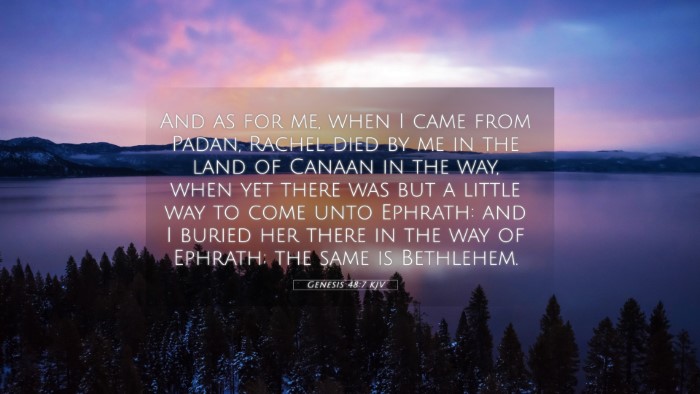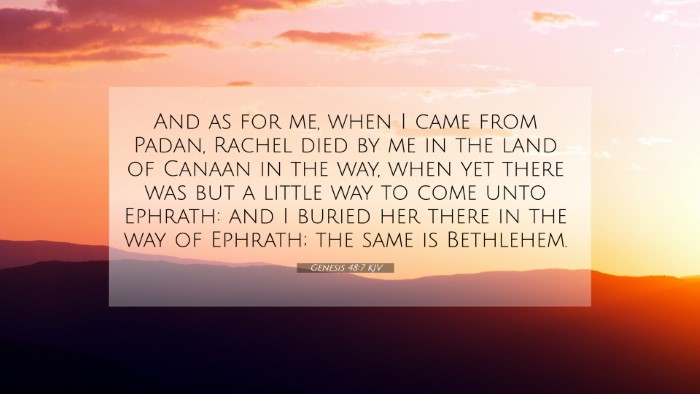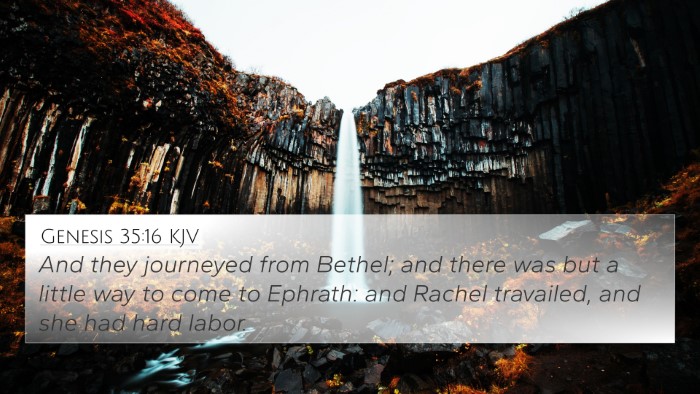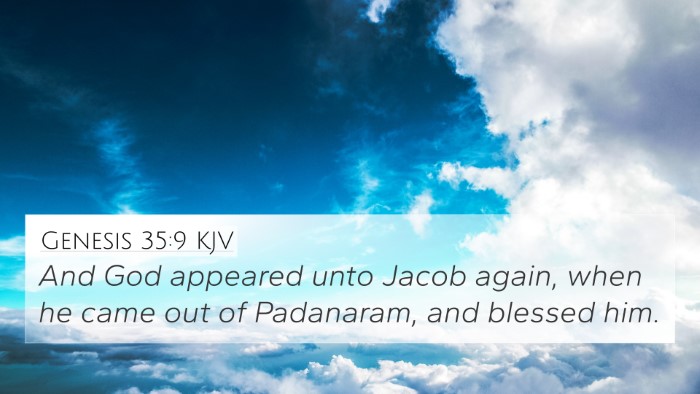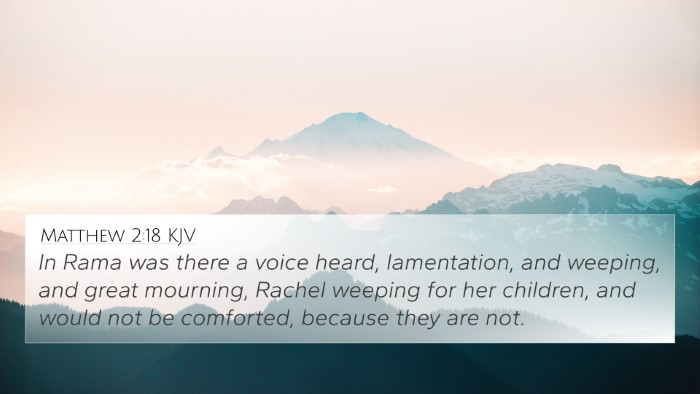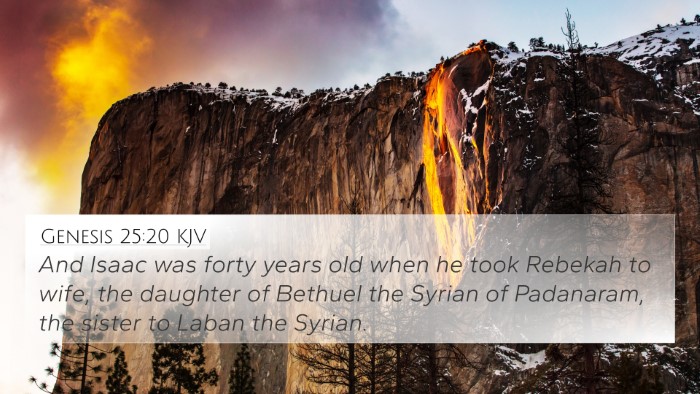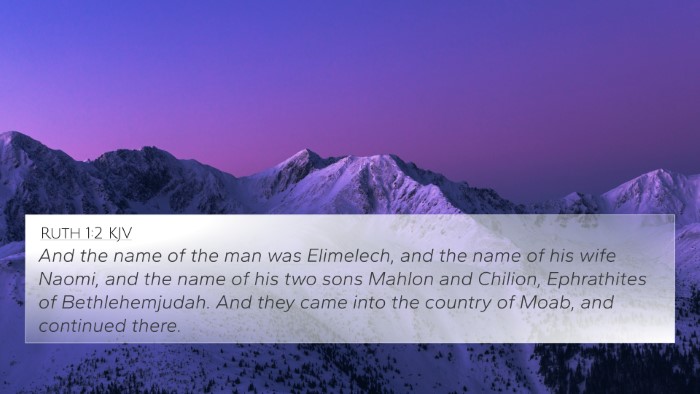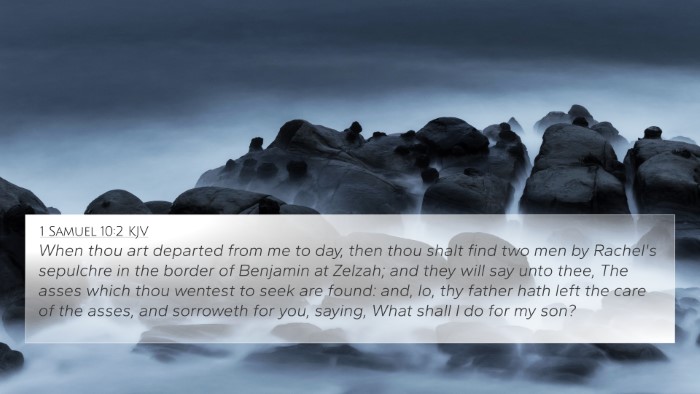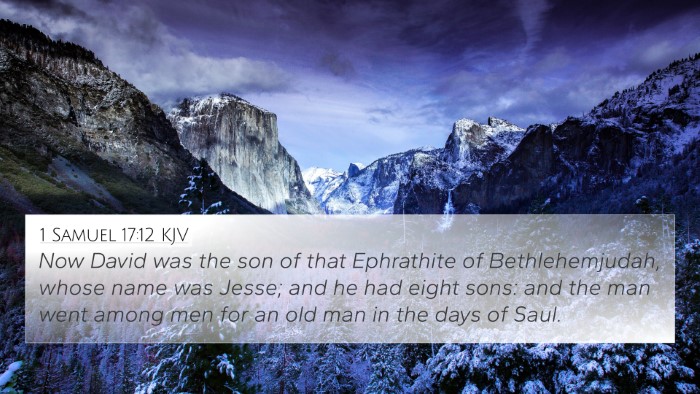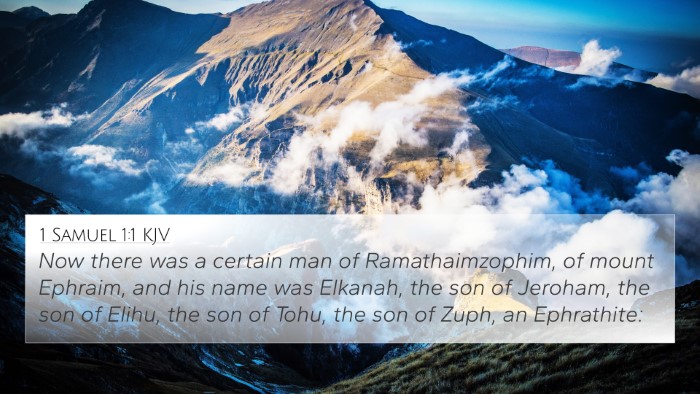Understanding Genesis 48:7
Genesis 48:7 states: "But as for me, when I came from Padan, Rachel died, beside me in the land of Canaan, on the way, when there was but a little distance to go to Ephrath; and I buried her there on the way to Ephrath, that is, Bethlehem."
This verse captures Jacob’s reflection on the loss of Rachel, his beloved wife, as he recounts the sorrowful event to his son Joseph and his grandsons, Ephraim and Manasseh. The mention of Rachel's death highlights themes of grief, remembrance, and the significance of familial bonds in the genealogy of Israel.
Commentary Insights
Matthew Henry notes that Jacob's sadness regarding Rachel's death is reflected in his narrative, emphasizing not only his personal loss but also its impact on his family lineage. He underscores that Rachel’s burial site, near Bethlehem, holds prophetic significance for future events in Israel’s history.
According to Albert Barnes, this verse illustrates Jacob's acknowledgment of God's providential plan for his family, even amid personal tragedy. The burial of Rachel alongside the road is symbolic of her enduring influence within the family and the nation of Israel.
Adam Clarke elaborates on the geographical marker of Ephrath (Bethlehem), noting how this setting is crucial to the understanding of Israel's heritage. His commentary connects Rachel's death to themes of yearning for redemption that culminates in the New Testament, where Bethlehem becomes the birthplace of Jesus Christ.
Thematic Connections
- Grief and Loss: This verse poignantly conveys the sorrow of losing a loved one, as seen throughout Scripture.
- Family Legacy: Rachel's death marks a significant moment in the genealogy of Israel, tying into the larger narrative of God's chosen people.
- Divine Providence: Jacob acknowledges God's sovereignty even in his personal tragedies, which echoes throughout Biblical history.
- Prophetic Significance: The burial site of Rachel foreshadows Bethlehem's future importance in redemptive history.
Cross-References for Genesis 48:7
To deepen the understanding of Genesis 48:7, several cross-referenced Bible verses can be explored:
- Genesis 35:19: "So Rachel died, and was buried on the way to Ephrath (that is, Bethlehem)." This verse confirms the account of Rachel's death and burial.
- Genesis 30:1: "When Rachel saw that she bore Jacob no children, she envied her sister; and said to Jacob, Give me children, or else I die." This illustrates Rachel's deep longing for children, which adds to the gravity of her loss.
- Matthew 2:18: "A voice was heard in Ramah, lamentation, weeping, and great mourning, Rachel weeping for her children..." This New Testament reference connects Rachel’s lament with the tragic events following Christ's birth.
- Ruth 4:11: "And all the people that were in the gate, and the elders, said, We are witnesses. The Lord make the woman that is come into thine house like Rachel and like Leah, which two did build the house of Israel..." This highlights Rachel's foundational role in Israel's lineage.
- Jeremiah 31:15: "Thus says the Lord: A voice was heard in Ramah, lamentation and bitter weeping, Rachel weeping for her children; refusing to be comforted for her children, because they are no more." This repeats the mourning theme associated with Rachel and highlights God’s promise of restoration.
- Romans 8:28: "And we know that in all things God works for the good of those who love him, who have been called according to his purpose." This reinforces the faith in divine providence amidst personal suffering.
- Hebrews 11:39-40: "These were all commended for their faith, yet none of them received what had been promised, since God had planned something better for us..." This links back to the larger pattern of faith and legacy throughout the Bible.
- Genesis 49:31: "There they buried Abraham and Sarah, there they buried Isaac and Rebecca, and there I buried Leah." This shows how burial places symbolize family heritage in Israel.
- Luke 2:4: "And Joseph also went up from Galilee, out of the city of Nazareth, into Judea, unto the city of David, which is called Bethlehem..." This ties into the messianic significance of the area where Rachel was buried.
Conclusion
Genesis 48:7 provides significant insight into Jacob's tribulations and the historical context of his family's story. The thematic elements of grief, legacy, and divine providence are woven intricately into this narrative, inviting readers to reflect on their own understandings of loss and hope in God's promises.
Through tools for Bible cross-referencing, readers can explore deeper connections between verses, enhancing their understanding of the scriptures as a cohesive and interrelated text. Methods such as thematic studies, concordances, and guided cross-reference resources are invaluable for those seeking to comprehend the numerous connections that form a rich tapestry of faith throughout the biblical narrative.

